|
|
|
Sort Order |
|
|
|
Items / Page
|
|
|
|
|
|
|
| Srl | Item |
| 1 |
ID:
084921
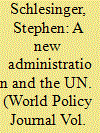

|
|
|
| 2 |
ID:
077890


|
|
|
|
|
| Publication |
2007.
|
| Summary/Abstract |
The Kyoto Protocol has been ratified by 164 states and is now fully operational. However, the Bush administration's repudiation of the Protocol combined with the weakness of the targets raise a confronting question for students of legitimacy: is it possible for a regime to be legitimate but ineffective in solving the problem it is designed to address? I argue that effectiveness is an important component of the Protocol's legitimacy but that the parties have been reluctant to make an issue of effectiveness during the early phase of the Protocol's operation. However, the legitimacy of the Protocol is likely to wane, and the chronic international legitimacy crisis of the Bush administration's climate change policy is likely to become acute, as a result of poor performance. I conclude by suggesting what might constitute significant and timely adaptation that might resolve the US's chronic legitimacy crisis and the Protocol's waning legitimacy
|
|
|
|
|
|
|
|
|
|
|
|
|
|
|
|
| 3 |
ID:
103102
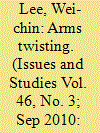

|
|
|
| 4 |
ID:
108254


|
|
|
|
|
| Publication |
2011.
|
| Summary/Abstract |
Some postmortems of the Bush Administration's pre-Iraq war decision-making have focused on a dysfunctional National Security Council (NSC) structure as the major reason for the lack of a thorough strategic assessment prior to the March 2003 invasion. Other academic and journalistic accounts have focused on a lack of a first rate conceptual thinker at the top levels of the Bush Administration as an important cause of the strategic shortcomings in Iraq decision-making. This article will assess the relative impact of decision-making structure versus quality of strategic leadership in explaining poor performance in the first five years of the Iraq war.
|
|
|
|
|
|
|
|
|
|
|
|
|
|
|
|
| 5 |
ID:
080924
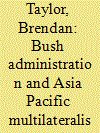

|
|
|
|
|
| Publication |
2008.
|
| Summary/Abstract |
This article challenges the presumed multilateral aversion of the George W. Bush administration. It argues that, at least in its approach toward the Asia-Pacific, this administration has been a more active and stimulatory advocate of multilateral approaches than is commonly acknowledged. The article begins by documenting the Bush administration's multilateral activism in the Asia-Pacific and examines those factors which appear to have contributed towards it. It then goes on to demonstrate, however, that Bush's at times unexpected enthusiasm for multilateral approaches has encountered a high degree of regional reticence. For a part of the world that has been affording an increased prominence to multilateral institutions and activities, this finding is initially both surprising and significant. The article concludes by seeking to account for this apparent anomaly and by considering its possible implications for the emerging regional architecture.
|
|
|
|
|
|
|
|
|
|
|
|
|
|
|
|
| 6 |
ID:
131446
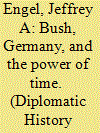

|
|
|
|
|
| Publication |
2013.
|
| Summary/Abstract |
George H.W. Bush backed German reunification with a puzzling degree of enthusiasm. His strategic reasoning was clear and not in dispute, as he desired to keep a unified Germany enmeshed within NATO. Less obvious, however, is his general forgiveness of Germany's past, for which he was pilloried. Yet history was much on Bush's mind in reaching these decisions. Germans had learned from the past, he argued. Europeans had not. They could not keep the peace no matter their ongoing political consolidation, his administration concluded by reading European history, without Americans in their midst. Bush backed unification, therefore, to ensure NATO's survival and thus an ongoing American presence on the continent. By studying Bush's sense of history, and a policymaker's historical sensibility more broadly, historians can thus gain greater insight into this decision and how strategic decisions are more generally formed
|
|
|
|
|
|
|
|
|
|
|
|
|
|
|
|
| 7 |
ID:
111244
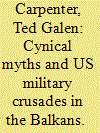

|
|
|
|
|
| Publication |
2011.
|
| Summary/Abstract |
Misleading propaganda and the creation of false history were pervasive and corrosive during the Balkan wars of the 1990s. Both the Clinton administration and the news media were responsible for the disreputable situation. And unlike the discrediting of the Bush administration's distorted accounts regarding the Iraq crisis, the Balkan myths are as prevalent today as when they were first created. That situation is dangerous on two counts. First, it inhibits the formulation of intelligent, realistic, and equitable policies regarding current Balkan issues. Second, the success of such a campaign of disinformation creates the irresistible temptation for officials and policy lobbies to try the same techniques during future international crises in that region or elsewhere.
|
|
|
|
|
|
|
|
|
|
|
|
|
|
|
|
| 8 |
ID:
081724
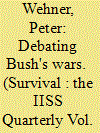

|
|
|
| 9 |
ID:
088902
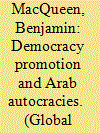

|
|
|
|
|
| Publication |
2009.
|
| Summary/Abstract |
This article explores the intersection between the policy of democracy promotion and the political dynamics of change in the Arab world. Based on extensive field research, this article unpacks the resilience of Arab regimes, asking the question: has the policy of democracy promotion assisted in the maintenance of autocratic and authoritarian regimes in the Arab world? Here, it is argued that the democracy promotion policy of the George W. Bush administration has enabled autocratic and authoritarian regimes across this region to enhance their capacity for social penetration and to exploit a lack of effort to promote the idea of democracy, facilitating direct and indirect modes of repression against opposition forces that have drawn from democracy promotion funding. This has enabled these regimes to enhance the processes of elite change, co-option and imitative institution building that have been central to their resilience in the face of seemingly unavoidable challenges.
|
|
|
|
|
|
|
|
|
|
|
|
|
|
|
|
| 10 |
ID:
115322
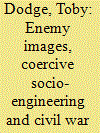

|
|
|
|
|
| Publication |
2012.
|
| Summary/Abstract |
Previous attempts to explain US policy towards Iraq from 2003 onwards have understood US intentions and actions through a coherent, rational-utility-maximizing model of the state. This article seeks to de-centre this rationalist explanation by examining the ideational drivers that shaped the Bush administration's understanding of Iraq and hence its policy towards the remaking of its post-invasion politics. In order to gain ideational coherence, both the Iraqi Ba'ath Party and the Sunni community were understood through a 'diabolical enemy image' schema. As a consequence, an 'exclusive elite pact' was constructed, a post-war political system specifically built to exclude former members of the Ba'ath Party and marginalize the participation of the Sunni community. This policy of exclusion drove the country into civil war. One side, Iraq's new ruling elite, fought to impose a victor's peace, the violent suppression of former members of the old regime. On the other, those excluded launched an insurgency to overturn the post-war political order.
|
|
|
|
|
|
|
|
|
|
|
|
|
|
|
|
| 11 |
ID:
077533
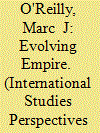

|
|
|
|
|
| Publication |
2007.
|
| Summary/Abstract |
This article examines U.S. policy in the Persian Gulf and juxtaposes American efforts in Iraq with those in the Gulf Cooperation Council states. As the U.S.-led effort to pacify and democratize Iraq continues to founder and with civil war underway in parts of the country, Washington pursues another imperial strategy in the Persian Gulf better suited to American security preferences and more likely to succeed, at least in the short term. In pursuing an "emirates" strategy, Washington seeks to indulge its historic preference for an informal empire in the Gulf that relies on cooperation with pro-American monarchs. While the Bush administration has touted Iraq's potential to remake the Middle East into a democratic haven, America seems prepared to rely on familiar autocrats to help it tackle terrorists in Southwest Asia and preserve Western access to critical supplies of hydrocarbons should Iraq's democratic rehabilitation prove unsuccessful
|
|
|
|
|
|
|
|
|
|
|
|
|
|
|
|
| 12 |
ID:
086349
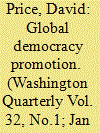

|
|
|
|
|
| Publication |
2009.
|
| Summary/Abstract |
A professed commitment to worldwide democracy promotion has been a hallmark of U.S. foreign policy for many years and was given a distinctive emphasis by the outgoing administration. President George W. Bush calls it "the urgent requirement of our nation's security, and the calling of our time."1 Promoting democracy, however, is not merely a matter of advocacy via an international megaphone. Policies of the Bush administration have led many to question the methods used to promote democracy or even the goal itself. Despite such criticism, much of it warranted, democracy promotion remains a central plank of U.S. foreign policy, an expression of U.S. values, and a tool that can be used to pursue the strategic interests of the United States. It is critically important, therefore, to learn from the mistakes of the past seven years and to rethink and refine the theory and practice of democracy promotion.
|
|
|
|
|
|
|
|
|
|
|
|
|
|
|
|
| 13 |
ID:
075254
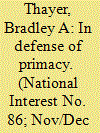

|
|
|
|
|
| Publication |
2006.
|
| Summary/Abstract |
Contrary to what Christopher Layne said in the last issue, the world is a long way away from seeing the end of U.S. primacy.
|
|
|
|
|
|
|
|
|
|
|
|
|
|
|
|
| 14 |
ID:
100416
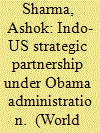

|
|
|
| 15 |
ID:
052938
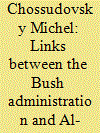

|
|
|
|
|
| Publication |
Apr-Jun 2004.
|
| Summary/Abstract |
Awareness is spreading fast worldwide that the US government is using fear (that is, terror) as a weapon to manipulate the masses at home and abroad in order to muster compliance with its repressive policies. In that light, Al-Qaida may turn out to be a mer tool in the hands of Washington's national security establishment.
|
|
|
|
|
|
|
|
|
|
|
|
|
|
|
|
| 16 |
ID:
088409
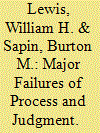

|
|
|
|
|
| Publication |
2009.
|
| Summary/Abstract |
The failures of process and judgment that help explain the war in Iraq are varied. Established patterns of policy making were overshadowed by mechanisms operating outside the formal system, notably by Vice President Richard Chaney. Also, an arrogant defense secretary overpowered senior military officers as well as the Department of State and its secretary. While it is difficult for Congress to constrain a president once a major military enterprise has been approved, Congress has been even more compliant that usual in this case. There are no panaceas, but manageable changes can strengthen the system and make another Iraq far less likely. The roles of the secretary of state and national security adviser need to be strengthened, and career military officers and civil servants must be encouraged and supported in their efforts to offer independent views to the political leadership. Most important is a policy environment open to varied perspectives rather than driven by narrow dogma.
|
|
|
|
|
|
|
|
|
|
|
|
|
|
|
|
| 17 |
ID:
084295
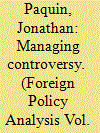

|
|
|
|
|
| Publication |
2008.
|
| Summary/Abstract |
This article attempts to explain why the U.S. recognition of Macedonia's independence was such a long and controversial issue that lasted from 1991 to 2004. Based on a defensive positionalist model, this essay suggests that the search of regional stability in the South Balkans was the consistent interest pursued by the U.S. toward Macedonia, and that this preference justifies the slowness with which the U.S. granted recognition. The article also runs counter to the ethnic lobby argument, which is increasingly regarded as a major determinant of American foreign policy toward self-determination movements. More specifically, the analysis casts serious doubt on the proposition that the Greek-American community, through its mobilization, compelled the U.S. government to delay Macedonia's recognition, despite what some liberals have argued.
|
|
|
|
|
|
|
|
|
|
|
|
|
|
|
|
| 18 |
ID:
099894
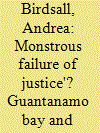

|
|
|
|
|
| Publication |
2010.
|
| Summary/Abstract |
This article considers challenges to the existing international human rights regime in the post-9/11 era. It uses an interdisciplinary approach that brings together issues of politics and law by focussing on international legal provisions and setting them into the context of International Relations theory. The article examines the establishment of Guantanamo Bay as a detention centre for suspected terrorists captured in the 'war on terror' and focuses on violations of international human rights and humanitarian law in the name of national security. This article demonstrates that the wrangling over Guantanamo Bay is an important illustration of the complex interaction between interests and norms as well as law and politics in US policy making. The starting point is that politics and law are linked and cannot be seen in isolation from each other; the question that then arises is what kind of politics law can maintain.
|
|
|
|
|
|
|
|
|
|
|
|
|
|
|
|
| 19 |
ID:
125094
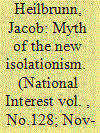

|
|
|
|
|
| Publication |
2013.
|
| Summary/Abstract |
SINCE SEPTEMBER 11, 2001, the United States has damaged its reputation and national security by lurching from one war to the next. Afghanistan, which began triumphantly for the Bush administration, has devolved into a protracted and inconclusive war in which the Taliban is making fresh inroads as American and allied forces hand over security to the Afghan army. Then there is Iraq. It was purveyed by the Bush administration to the American public as a mission that could be accomplished swiftly and smoothly. Neither occurred. Since then, President Obama's self-styled humanitarian intervention in Libya has led to instability, allowing local militias, among other things, to pretty much bring the oil industry to a standstill by disrupting major export terminals.
|
|
|
|
|
|
|
|
|
|
|
|
|
|
|
|
| 20 |
ID:
114720
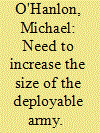

|
|
|
|
|
|
|
|